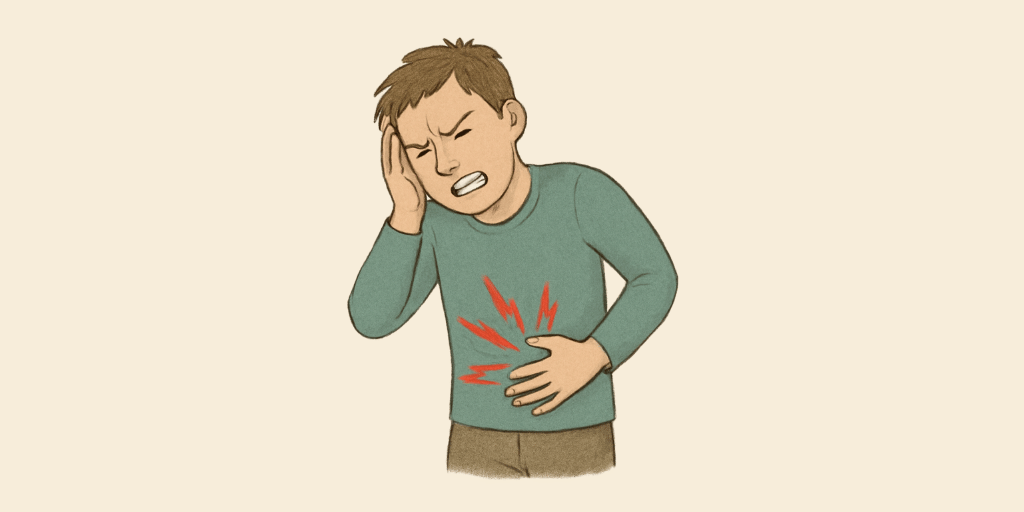Ayurvedic Name: Shoola
Description:
Shoola is pain, which can occur in the abdomen (colic), head, or other body parts due to aggravated Vata causing spasms and contractions. Ayurvedic treatment includes herbal oils, Dashmoola, Ajwain, and soothing therapies to relieve pain and restore balance.
Signs & Symptoms:
- Shoola (Pain): Sharp, acute pain that may be intermittent or constant, often associated with swelling or heat in the affected area.
- Vata Shoola (Pain from Vata Dosha): Sharp, stabbing pain, often caused by Vata imbalances such as gas or dryness.
- Pitta Shoola (Pain from Pitta Dosha): Burning, throbbing, or piercing pain, typically due to inflammation or infection.
- Kapha Shoola (Pain from Kapha Dosha): Heavy, dull, or aching pain, often caused by stagnation or congestion in the body.
- Stambha (Stiffness): Reduced flexibility or difficulty moving the affected area due to pain and inflammation.
- Shwasa (Breathlessness): Difficulty breathing or shallow breathing, particularly if pain affects the chest or abdomen.
- Dourbalya (Weakness): General fatigue or weakness from prolonged pain, leading to limited mobility and discomfort.
Diagnosis:
Pain Scale Assessment and Physical Palpation
Risk Factors:
- Dietary Factors
Excessive Spicy or Sour Foods: These foods can increase acidity and cause stomach pain, especially in individuals with sensitive digestive systems.
Overeating or Eating Large Meals: Overloading the stomach with food can cause discomfort and pain, leading to digestive distress. - Lifestyle Factors
Physical Injury or Strain: Injury to the body, particularly the joints or muscles, can lead to localized pain.
Stress and Anxiety: Chronic stress can contribute to tension, muscle cramps, and headaches, leading to pain in various areas of the body. - Medical Conditions
Arthritis or Inflammation: Conditions like osteoarthritis or rheumatoid arthritis can cause joint pain and discomfort.
Digestive Disorders: Conditions like IBS, acid reflux, or Crohn’s disease can cause abdominal pain and discomfort.
Complications:
- Chronic Pain (Dukha): Untreated pain can become chronic, severely affecting quality of life.
- Muscle Atrophy (Vishalyaka): Pain that limits movement can result in weakened muscles due to disuse.
- Impaired Mobility (Chalana Vikruti): Persistent pain in joints or muscles can reduce mobility and hinder daily activities.
- Emotional Distress (Manasik Dourbalya): Chronic pain often leads to mental health issues such as depression and anxiety.
- Sleep Disturbance (Nidra Vikruti): Ongoing pain can interfere with sleep, leading to fatigue, reduced energy, and poor health outcomes.
Epidemeology:
Affects about 10-20% of the global population, with chronic pain being a significant concern in adults, particularly those over 50.
More prevalent in individuals with conditions like arthritis, neuropathy, back pain, or migraine headaches.
Women are more likely to experience chronic pain conditions, including fibromyalgia and migraines, due to hormonal factors and autoimmune diseases.
Pain-related disorders are among the leading causes of disability worldwide.

